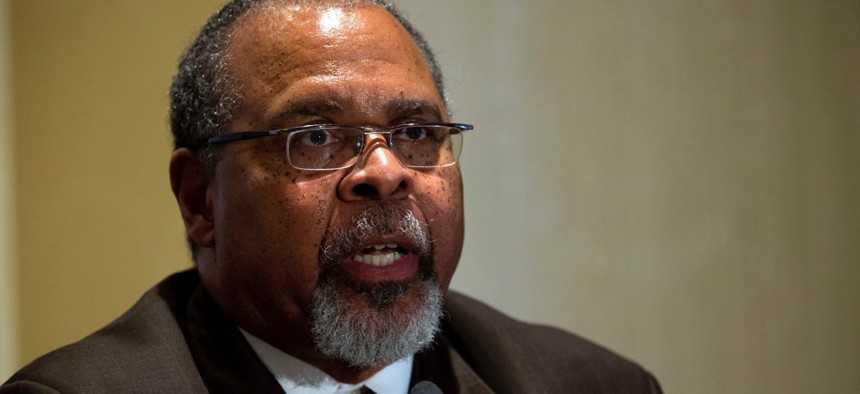Trump Commission Already Having ‘Chilling Effect’ on State Voter Registration

Former Ohio Secretary of State Ken Blackwell is one of the members of President Trump's Election Integrity Commission that has civil rights lawyers concerned about voter privacy. Mary Altaffer / AP Photo
“The commission is spearheaded by the four horsemen of voter suppression,” the Lawyers’ Committee for Civil Rights Under Law president and executive director said.
President Trump’s Advisory Commission on Election Integrity is already having a chilling effect on voters in at least four states who have been attempting to remove themselves from registration rolls to protect their personal information, according to the Washington, D.C.-based Lawyers’ Committee for Civil Rights Under Law.
Last month, the advisory commission’s vice chair, Kansas Secretary of State Kris Kobach, issued letters to every state seeking massive amounts of sensitive voter roll data without showing a draft to other commissioners, as first reported by Route Fifty. They did, however, debate the letter during a potentially unlawful conference call on June 28.
Since Kobach mailed his letters, voters in Colorado, Arizona, North Carolina and Florida have sought to purge their names from the rolls, said Kristin Clarke, Lawyers’ Committee president and executive director, during a conference call on Tuesday.
“This is certainly one of the most vicious attempts to promote voter suppression at the national level that we have seen in modern times,” she said.
Election officials in Maricopa County, Arizona, which includes Phoenix, have received calls from concerned voters wondering what will be done with their data if publicized, she said, and those in Flagler County, Florida, have fielded removal requests. The commission is also ignoring state laws protecting the privacy of domestic violence victims.
Clarke urged states’ top election officials not to support the commission or provide it any information until questions about how the entity works are answered, applauding California Secretary of State Alex Padilla and Kentucky Secretary of State Alison Grimes—both Democrats—for taking that stance.
The commission has announced its July 19 meeting would only be available to the public via livestream, prompting the Lawyers’ Committee and the American Civil Liberties Union to file federal lawsuits on separate grounds but both alleging Federal Advisory Committee Act violations.
FACA was enacted by Congress as a means to ensure those advising the federal government provided objective advice and held deliberations in a way that was accessible to the public. At issue in the Lawyers’ Committee suit is whether the commission is in violation of Section 10 for failing to disclose all of its records, including emails between members, prior to its meeting and Section 10A for closing its meetings to the public.
The Lawyers’ Committee requested documents of the commission on July 3 and received no response.
While both suits name Trump and the commission, the ACLU litigation also claims a violation of FACA Section 5, which stipulates that presidential commissions be fair and balanced in terms of the views represented.
“This commission was designed to sell a lie,” said Dale Ho, the ACLU’s Voting Rights Project director, referring to Trump’s unsubstantiated post-election claims he would have won the popular vote over Hillary Clinton had 3 to 5 million people not voted fraudulently.
Kobach, who exaggerated evidence of non-citizen and double voting in his own state and pushed through the burdensome requirement that new registrants show a citizenship document, has echoed Trump’s allegations. One out of every seven voter registration applications in Kansas is rejected because most people don’t carry a passport or birth certificate with them or feel comfortable handing those to a stranger, Ho said, and Kobach’s requirement has been found in violation of the National Voter Registration Act of 1993 on more than one occasion.
Ho pointed out Kobach was photographed holding a memo prior to a meeting with the president that proposed amending the very same “Motor Voter Law” to make his brand of registration legal and make his “Kansas experiment a nationwide voter suppression effort.”
“The commission is spearheaded by the four horsemen of voter suppression,” Clarke said, referring to Kobach, conservative attorney J. Christian Adams, former Federal Election Commission member Hans von Spakovsky, and former Ohio Secretary of State Ken Blackwell, who disclosed the full Social Security numbers of nearly 7 million voters while in office.
Not content to wait for states to make a decision regarding the release of voter data to Trump’s commission, the Lawyers’ Committee also filed a Hatch Act complaint against Kobach with the U.S. Office of Special Counsel accusing him of using his position of vice chair to promote his Kansas gubernatorial run and solicit campaign donations.
The ACLU expects the briefing on its motion to be completed Friday and a judge’s order to come shortly thereafter. Ho said the ACLU is requesting that all commission documents be made public, future telephonic meetings be advertised and made available to public, and the July 19 meeting be moved to a building that’s open and accessible to the public.
“We don’t understand the agenda of this commission or how it will operate,” Clarke said.
Dave Nyczepir is a News Editor at Government Executive’s Route Fifty and is based in Washington, D.C.
NEXT STORY: Impacts of Florida Governor’s New Anti-Venezuela Action Are Unclear






